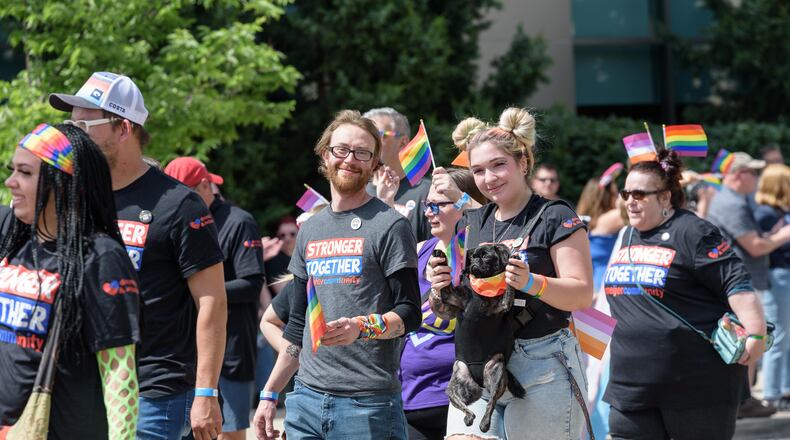No matter the causes at the forefront, Dayton’s Pride activities are an inclusive, weekend-long celebration that begin with an interfaith service June 5. Then on June 7, a parade will kick off at 11 a.m. on Second Street, followed by a festival on St. Clair Street with live music, merchandise, vendors and a dedicated family area.
Credit: Tom Gilliam
Credit: Tom Gilliam
Additional events will happen throughout the weekend.
Dayton Police announced some road closures for the weekend events:
Beginning Friday, June 6, at 3 p.m. (until approximately 5 p.m. June 7):
- St. Clair Street between First and Third streets
- Second Street between Patterson Boulevard and St. Clair Street
Beginning Saturday, June 7, at 10:45 a.m. (until approximately 12:45 p.m. June 7):
- Jefferson Street between First and Third streets
- Second Street between Jefferson and Ludlow streets
- Main Street between Monument Avenue and Third Street
- First Street between Ludlow and St. Clair streets
The parade will travel:
- North on Jefferson to Second Street
- West on Second to Main Street
- North on Main to First Street
- East on First to St. Clair Street (End)
Credit: Tom Gilliam
Credit: Tom Gilliam
Credit: Tom Gilliam
Credit: Tom Gilliam
History of Pride (from the Associated Press)
The monthlong global celebration began with Gay Pride Week in late June 1970, a year after the violent police raid at New York’s Stonewall Inn, a gay bar.
At a time when many LGBTQ+ people kept their identities private, the June 28, 1969, raid sparked a series of public protests and catalyzed the gay rights movement.
The first pride week featured marches in Chicago, Los Angeles, New York and San Francisco, and it has since grown to other cities. On the calendar are events in Philadelphia this weekend; New Orleans on June 14; Chicago on June 21 and 22; and New York over the weekend of June 28 and 29. Many other events in big cities and small towns are also planned.
There are pride celebrations around the world, including in Tokyo on June 8; Toronto on June 27-29; Sao Paolo on June 22; and Paris on June 28.
Some events fall outside of June, too. World Pride, a biannual event held this year in Washington, D.C., began in May and goes through June 8. Pride in London is in July; a big celebration in Rio de Janeiro is in November and Atlanta’s is in October.
Former President Bill Clinton proclaimed June as Gay and Lesbian Pride Month in 1999, marking the first time a U.S. president did so.
This year’s celebrations in the U.S.
Organizers of Milwaukee’s PrideFest are prepared for close to 50,000 people at the event scheduled for June 5-7.
“We’re feeling that people will be showing up, and that’s their protest,” said Wes Shaver, the president and CEO of Milwaukee Pride, Inc.
The event’s theme is “Celebrating the Power of Pride” and for the first time, one of the entertainment stages one night will feature only transgender performers. Shaver said that’s an intentional move in response to Trump’s policies. Another night, the stage will feature only performers of color.
Jeremy Williams, the executive producer of Philly Pride 365 in Philadelphia, said he didn’t expect more protest than in the past there.
“Everybody’s just there to be together,” he said.
The 10th anniversary of same-sex marriage legalized nationwide
One milestone that’s likely to be celebrated: This month marks the 10th anniversary of the U.S. Supreme Court’s Obergefell v. Hodges ruling, which recognized same-sex marriage nationwide. It was a watershed event in establishing rights for LGBTQ+ people across the country.
About two-thirds of LGBTQ+ adults in the U.S. said the case made the nation more accepting of same-sex couples, according to a Pew Research Center poll released last week.
The poll found that LGBTQ+ people don’t always feel accepted, though. About 6 in 10 said they see “a great deal” or “a fair amount” of social acceptance for those who are lesbian, gay or bisexual. But only about 1 in 10 said the same is true for nonbinary and transgender people.
About the Author



